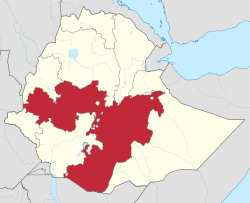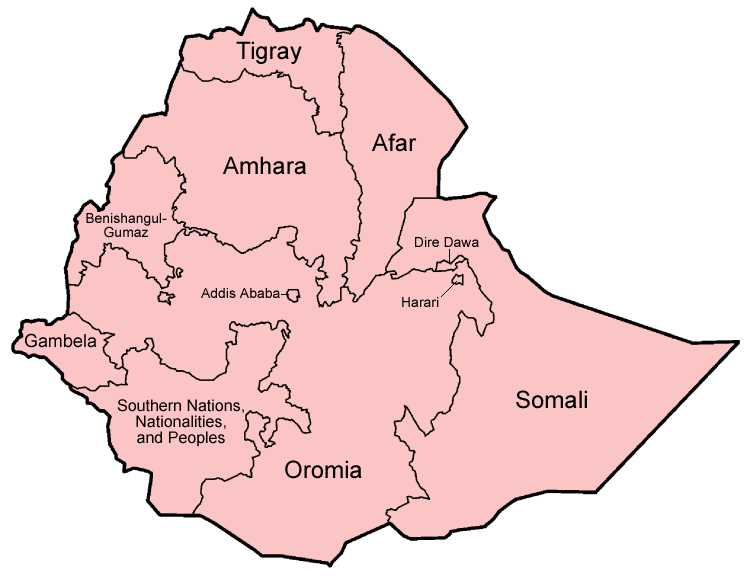October 2019 Ethiopian clashes
A nationwide series of violent protests, concentrated in the Oromia Region, broke out in Ethiopia starting on 23 October 2019, sparked by activist and media owner Jawar Mohammed's report that security forces had attempted to vacate his security guards. According to official reports, 86 people were killed, mostly by mobs targeting ethnic and religious minorities within the region and surrounding areas, including Addis Ababa, Dire Dawa, and the Harari Region.[lower-alpha 1]
| October 2019 Ethiopian clashes | |
|---|---|
 The Oromia Region in Ethiopia. | |
| Location | Oromia Region, Ethiopia and vicinity |
| Date | 23 – 28 October 2019 |
| Target | Non-Oromos, supporters of Abiy Ahmed, various religious groups |
Attack type | Pogrom, looting, arson, mass murder |
| Deaths | 86 |
| Injured | 800+ (as of October 2019) |
| Perpetrators | Supporters of Jawar Mohammed and the Youth Movement for Freedom and Democracy (Qeero) |
| Motive | Ethno-nationalist extremism |

Background
In October 2019, Ethiopian activist and media owner Jawar Mohammed reported that members of the police had attempted to force his security detail to vacate the grounds of his home in Addis Ababa in order to detain him the night of 23 October, intimating that they had done so at the behest of Prime Minister Abiy Ahmed. The previous day, Abiy had given a speech in Parliament in which he had accused "media owners who don't have Ethiopian passports" of "playing it both ways", a thinly veiled reference to Jawar, adding that "if this is going to undermine the peace and existence of Ethiopia... we will take measures."[1][2]
Events
The reports sparked nationwide riots by the Qeero, leaving at least 67 people dead, including five police officers.[3][4][5] The morning after the report, Jawar's supporters congregated around his house in Addis Ababa to protest, denouncing Prime Minister Abiy and his government. After the protests spread to the Karakore neighborhood, local residents counter-protested, resulting in police intervention to separate the two groups.[6] Rioters blocked key highways, in particular roads leading to Addis Ababa. There were however scenes of kindness; residents in Welkite and Butajira provided food and shelter for those stuck on the road.[7] An eyewitness told Reuters that he had seen the bodies of at least seven people who had been "beaten to death using sticks, metal rods and machetes".[8]
On 23 October, clashes occurred in Ambo, Adama (Nazret), and Haramaya (Alemaya), killing at least 6 and injuring 40. Road blockages were reported in Shashamane and riots occurred in Addis Ababa and surrounding towns, including the neighborhoods of Bole Bulbula, Kotebe, and Karakore.[9] In Dodola woreda, the violence targeted the Orthodox community, with shops and houses attacked. Members of the community took shelter in the local church, but there were "dozens injured" after a grenade was thrown into the church yard. Later, police took some of the injured for medical treatment, but "a mob stopped the vehicle and brutally killed three of the injured" before they could reach the hospital.[10] Victims told Agence France-Presse that in Adama rioters attacked those who could not speak Oromo, and those Oromos who refused to participate in the violence. "“If they [the Qeero] find you speak Afaan Oromo, they invite you to join with them,” one hospitalized victim said. “If you say no, they will attack you as well.”[11]
On 24 October, 68 people were arrested after looting and attempting to burn a mosque and church in Adama, according to the city's mayor, in an attempt to "spark ethnic and religious conflict".[8] In Arsi, at least 4 were killed when a factory was attacked, including the owner, his son, and a number of employees.[7] The Ethiopian Orthodox Tewahedo Church called for peace and condemned the violence in a meeting with government officials.[12] Jawar appealed for calm and claimed that his supporters were re-opening roads, but at the same time told his followers "to sleep with one eye open"; riots continued.[2]
On 25 October, at least one man was killed in Dire Dawa.[13] Security forces had been deployed in Ambo, Bishoftu, Bale Robe, Mojo, Adama, Harar, and Dire Dawa. A group in Adama attacked a Voice of America reporter who was covering the riots; he was taken to hospital but escaped serious injury.[14] A national blood drive was launched to help the victims, with over 100,000 participating in the first two days.[15] Kefyalew Tefera, Oromo Regional police commissioner, said that there had been "a hidden agenda to divert the whole protest into an ethnic and religious conflict; there were attempts to burn churches and mosques."[8] The official death toll had reached 67, with 15 rioters having been killed by security forces and the remainder killed by others, including at least five police officers.[8] According to local media, "citizen reports" however suggest the true death toll is upwards of one hundred.[7]
On 31 October, Prime Minister Abiy updated the death toll to at 78, adding that least 400 people had been arrested around the country in connection with the attacks.[16] The Ethiopian Human Rights Commission estimated that 10 of those killed died at the hands of security forces, with the remainder being killed in clashes.[16]
Aftermath and reactions
_(cropped).jpg)
Today I am deeply grieved. I have the urge to weep like a child. My heart is crushed by grief. My eyes have had no sleep, but many tears. In the day to day hopes for improvement, we have been asking the government to put a stop to it [the violence]. However we have seen nothing change. Instead I have caused my children to be massacred. While I was preaching to you about peace, those that do not know peace have deprived you of peace.
Prime Minister Abiy, who had been in Sochi attending the Russia-Africa Summit, issued a statement upon his return the evening of the 26th, in which he vowed "to bring the perpetrators to justice" and warned that instability could worsen if "Ethiopians did not unite". Billene Seyoum, Press Secretary to the Prime Minister, said that violence was in part a "backlash" to plans to merge the ruling Ethiopian People's Revolutionary Democratic Front into a single party.[16]
Abiy has been criticised for his belated response to the violence, including by the Ethiopian Orthodox Tewahedo Church.[18][5] "People are dying and questions are being raised if the government even exists. The people are losing all hope," said a church spokesman.[18] On October 28, Abune Mathias, Patriarch of the Orthodox Church, made an emotional appeal for the violence to stop and expressed his grief over the casualties. Another bishop said that the faithful who had been killed had "thought that they were living among fellow humans but were unexpectedly devoured by wolves".[17]
Shimelis Abdisa, acting President of the Oromo Region, condemned the "incident" with Jawar, terming it a "major mistake", and called for an investigation.[19][20] Federal Police Commissioner, General Endeshaw Tassew, denied that the police had targeted Jawar, but said that they had been "reassessing the need for private security details for VIPs".[19]
Notes
- While the Oromo are the largest ethnic group in Ethiopia, they do not constitute a majority.
References
- Dahir, Abdi Latif (24 October 2019). "Protests in Ethiopia Threaten to Mar Image of Its Nobel-Winning Leader". New York Times. Retrieved 24 October 2019.
- Tiksa, Negeri (24 October 2019). "Ethiopia activist calls for calm after 16 killed in clashes". Reuters. Retrieved 24 October 2019.
- Peralta, Eyder; Dwyer, Colin (24 October 2019). "Nobel Peace Prize Winner Faces Protests After Activist's Late-Night Standoff". NPR. Retrieved 24 October 2019.
- "Anti-government protests leave 67 dead in Ethiopia - police". TRT World. 25 October 2019. Retrieved 26 October 2019.
- Marks, Simon (25 October 2019). "67 Killed in Ethiopia Unrest, but Nobel-Winning Prime Minister Is Quiet". New York Times. Retrieved 26 October 2019.
- Sileshi, Ephrem; Fasil, Mahlet (24 October 2019). "Analysis: Protests, security standoff across Oromia, Addis Abeba - what happened". Addis Standard. Retrieved 26 October 2019.
- "Ethiopia's Oromo region violence death toll reach 67". Borkena. 25 October 2019. Retrieved 26 October 2019.
- Fick, Maggie (26 October 2019). "Violence during Ethiopian protests was ethnically tinged, say eyewitnesses". Reuters. Retrieved 26 October 2019.
- "News Update: More casualties, roadblocks continue for 2nd day as elders, authorities attempt to pacify protests". Addis Standard. 24 October 2019. Retrieved 26 October 2019.
- Fantahun, Arefaynie (25 October 2019). "Ethnic Amharas targeted in killings in Oromia region". Ethiopia Observer. Retrieved 26 October 2019.
- "'Still I'm afraid': Victims reel from deadly Ethiopia clashes". New Straits Times. Agence France-Presse. 1 November 2019. Retrieved 1 November 2019.
- "EOTC, Gov't Discuss Current National Issues". FanaBC. 26 October 2019. Archived from the original on 26 October 2019. Retrieved 27 October 2019.
- Endashaw, Dawit (26 October 2019). "Chaotic Days". The Reporter. Retrieved 26 October 2019.
- "Ethiopia: Qeerroo attacked VOA reporter while covering stories in Adama". Borkena. 25 October 2019. Retrieved 26 October 2019.
- "Ethiopia Launches Blood Donation Campaign". FanaBC. 26 October 2019. Archived from the original on 26 October 2019. Retrieved 27 October 2019.
- "Ethiopia arrests 400 as govt defends response to deadly ethnic violence". Yahoo News. Agence France-Presse. 31 October 2019. Retrieved 1 November 2019.
- "Ethiopian Patriarch's tearful message for followers of Orthodox church". Borkena. 28 October 2019. Retrieved 28 October 2019.
- "Orthodox Ethiopians criticise PM Abiy over deadly clashes". Yahoo News. Agence France-Presse. 27 October 2019. Retrieved 27 October 2019.
- Abiye, Yonas (26 October 2019). "Roaring October". The Reporter. Retrieved 27 October 2019.
- Melton, Marissa; Halake, Sora; Wayessa, Dhaba (24 October 2019). "Protests in Ethiopia's Oromia Region (sic) Call Security Into Question". Voice of America. Retrieved 27 October 2019.